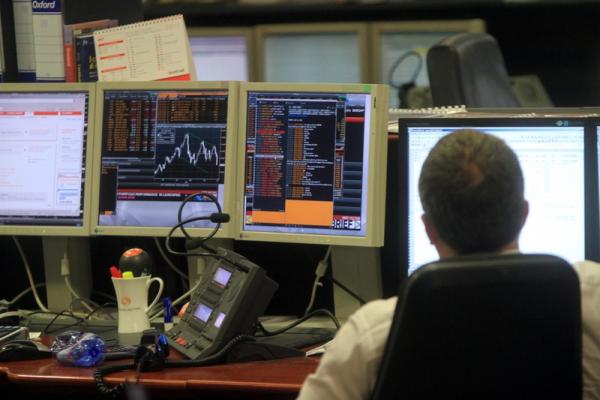Amcor stock falls after Raymond James reiterates Market Perform rating
* Graphic: World FX rates in 2019 http://tmsnrt.rs/2egbfVh
* French, German and Euro zone PMIs weaker than expected
* Oil falls below $64
* MSCI All Country World Index down 0.2%
By Ritvik Carvalho
LONDON, Sept 23 (Reuters) - Global shares sank on Monday as
weaker-than-expected economic data added to investor worries
over the unresolved U.S.-China trade dispute's effects on the
world economy.
European stock markets opened lower as surveys of purchasing
managers from France, Germany, and the euro zone came in weaker
than expected. The pan-European STOXX 600 .STOXX index was
down 0.9%. .EU The euro fell 0.4% to $1.0966 EUR=EBS after the German
Purchasing Managers' Index (PMI) release, its lowest in over a
week against the dollar. FRX/
Germany's DAX index .GDAXI hit its lowest level in nearly
two weeks, down 1.35% after the euro zone data, while France's
CAC 40 .FCHI fell nearly 1%.
"Considering that Germany already contracted in Q2, today's
numbers effectively increase the risk of another negative
quarter in Q3, which by definition would constitute a technical
recession," said Marios Hadjikyriacos, investment analyst at XM.
"It seems that the malaise in manufacturing -- owed to trade
and Brexit worries -- has started to spread to the much larger
services sector as well."
Euro zone business growth has stalled this month, a survey
showed on Monday, less than two weeks after outgoing ECB
President Mario Draghi pledged indefinite stimulus to revive the
bloc's ailing economy. The recent switch back into support mode by top central
banks including the U.S. Federal Reserve, the ECB and China's
PBOC has swollen the amount of bonds trading at negative rates
to a record of more $17 trillion.
The Bank for International Settlements in its latest report
said the growing acceptance of negative interest rates - where
investors effectively pay for the privilege of lending - has
reached "vaguely troubling" levels. MSCI's All Country World Index .MIWD00000PUS , which tracks
shares across 47 countries was down 0.25%.
U.S. stock futures - earlier up 0.4% - fell after the PMI
data in Europe. S&P 500 E-mini futures ESc1 last traded flat.
Protests in Cairo and other major cities against government
corruption had forced the suspension of Egypt's main stock
market on Sunday and the strains spilled into debt and foreign
exchange as major trading centres like London began their week.
In the FX non-deliverable forward (NDF) markets, the
Egyptian pound weakened to 18.36 to the U.S. dollar
EGP1YNDFOR= and widened the gap with the more managed spot FX
rate, which was at 16.26 pounds EGP= .
The government's dollar-denominated bonds fell as much 3
cents in the dollar too. EG195305749=
"We don't think this will be a repeat of the Arab Spring,"
said Aberdeen Standard Investments' Kevin Daly. But apparently
there will be more demonstrations scheduled for Friday so let's
see how that pans out."
TRADE CONCERNS
Most Asian share markets slipped as investors waited for
more clarity on U.S.- China trade talks.
MSCI's broadest index of Asia-Pacific shares outside Japan
.MIAPJ0000PUS fell 0.3%.
Over the weekend, the U.S. Trade Representative's office
issued a brief statement characterising the two days of talks
with China as "productive." It added that a principal-level
trade meeting in Washington would take place in October, as
previously planned. China's Commerce Ministry, in a brief statement, described
the talks as "constructive", and said they had also had a good
discussion on "detailed arrangements" for the high-level talks
in October.
Additionally, the United States removed tariffs from more
than 400 Chinese products in response to requests from U.S.
companies. Despite the improved tone, markets still remain unconvinced
about the possibility of an imminent deal.
Investors were rattled by news on Friday that Chinese
officials unexpectedly cancelled a visit to U.S. farms this week
following their two days of negotiations in Washington.
In the Middle East, news that five Yemeni civilians were
killed in air strikes by the Saudi-led coalition further soured
investor appetite. Oil fell below $64 a barrel, reversing an earlier gain,
pressured by the prospect of a faster-than-expected full restart
of Saudi Arabian oil output and by fresh signs of European
economic weakness. O/R
A source, briefed on the latest developments in the Sept. 14
attack on Saudi oil facilities, told Reuters Saudi Arabia has
restored around 75% of crude output lost. Brent crude futures LCOc1 - the international benchmark
for oil - fell 0.2% to $63.98 per barrel. O/R
U.S. crude oil futures fell 0.6% to $57.79 a barrel. O/R
The Pentagon has ordered additional troops to be deployed in
the Gulf region to strengthen Saudi Arabia's air and missile
defences following an attack on Saudi oil facilities.
Markets will closely watch September manufacturing activity
surveys due from the United States later in the day.
In currencies, the dollar gained 0.23% against a basket of
currencies DXY= .
